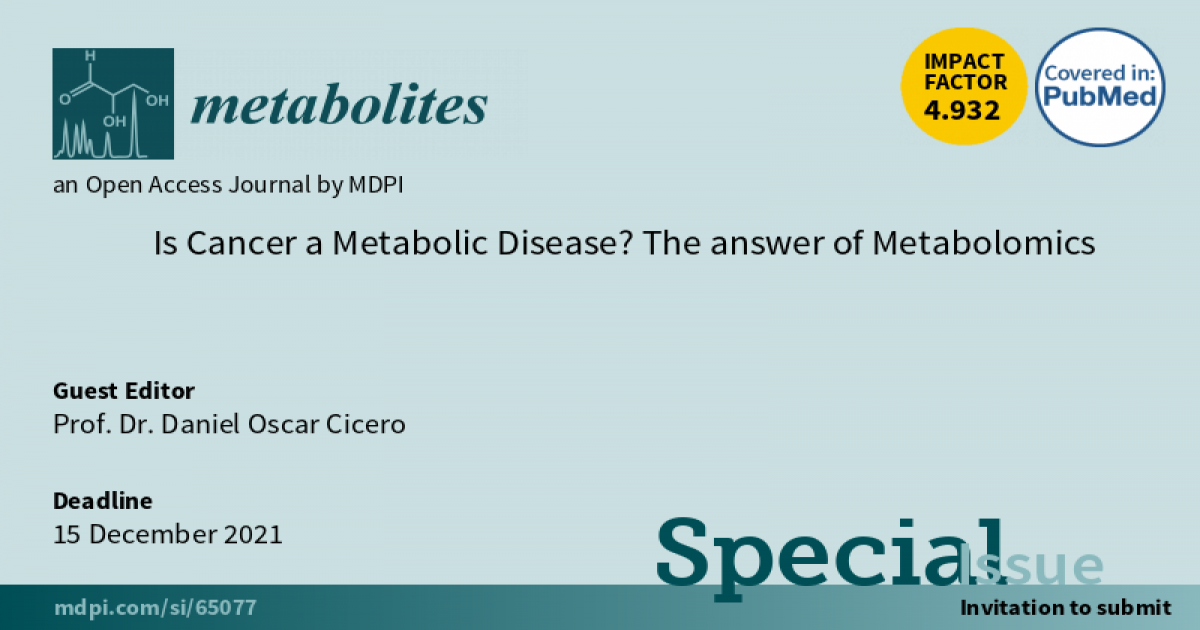Is Cancer a Metabolic Disease? The Answer of Metabolomics
A special issue of Metabolites (ISSN 2218-1989). This special issue belongs to the section "Advances in Metabolomics".
Deadline for manuscript submissions: closed (15 December 2021) | Viewed by 42135

Special Issue Editor
Interests: nuclear magnetic resonance; metabolomics; bladder cancer; cardiovascular diseases; metabolism and excercise
Special Issues, Collections and Topics in MDPI journals
Special Issue Information
Dear Colleagues,
Cancer is almost unanimously considered to be the result of genetic alterations at the nuclear level of oncogenes and tumor suppressor genes. This theory is considered almost a dogma, to the point that the National Cancer Institute states that “Cancer is a genetic disease—that is, it is caused by changes to genes that control the way our cells function, especially how they grow and divide”. In this context, the metabolic changes observed in cells, tissues, and organisms are the consequence of these genetic signatures. However, several inconsistencies of this theory have been observed, giving rise to an alternative explanation of cancer as a disease that begins with a mitochondrial metabolic dysfunction, in some sense returning to Otto Warburg’s original observation. Recent data indicate, however, that mitochondrial metabolism can be down- or upregulated, giving rise to two types of tumors: oxidative and nonoxidative. From this perspective, metabolic alterations are the cause of the genetic alterations that influence the development of cancer. What causes metabolic alteration is a matter of discussion, but potential candidates are increased inflammation, increased ROS formation, and overstimulation of PARPs. Although we do not yet have enough evidence to fully embrace the metabolic theory, or to accurately weight the relative importance that both factors, genetic mutations and metabolic alterations, play in the origin of the disease, metabolomics can make a significant contribution. The fact that metabolism can have a crucial role places it on the same level as genomics and transcriptomics for the diagnosis and prognosis of cancer and assigns it a unique place for the discovery of new specific therapeutic targets. In this exciting field, we still have almost everything to discover and much to gain in the understanding of a disease that has become one of the most demanding challenges of modern medicine.
Prof. Dr. Daniel Oscar Cicero
Guest Editor
Manuscript Submission Information
Manuscripts should be submitted online at www.mdpi.com by registering and logging in to this website. Once you are registered, click here to go to the submission form. Manuscripts can be submitted until the deadline. All submissions that pass pre-check are peer-reviewed. Accepted papers will be published continuously in the journal (as soon as accepted) and will be listed together on the special issue website. Research articles, review articles as well as short communications are invited. For planned papers, a title and short abstract (about 100 words) can be sent to the Editorial Office for announcement on this website.
Submitted manuscripts should not have been published previously, nor be under consideration for publication elsewhere (except conference proceedings papers). All manuscripts are thoroughly refereed through a single-blind peer-review process. A guide for authors and other relevant information for submission of manuscripts is available on the Instructions for Authors page. Metabolites is an international peer-reviewed open access monthly journal published by MDPI.
Please visit the Instructions for Authors page before submitting a manuscript. The Article Processing Charge (APC) for publication in this open access journal is 2700 CHF (Swiss Francs). Submitted papers should be well formatted and use good English. Authors may use MDPI's English editing service prior to publication or during author revisions.
Keywords
- Cancer metabolism
- Metabolomics
- Carcinogenesis
- Cancer biomarkers






